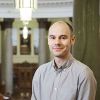
Dr Richard De Ritter
- Position: Lecturer
- Areas of expertise: Eighteenth-century women’s writing; children's literature; Jane Austen; animal studies
- Email: R.DeRitter@leeds.ac.uk
- Phone: +44(0)113 343 4742
- Location: 7.1.06 7 Cavendish Road, School of English
- Website: ORCID
Profile
I studied for my PhD here at Leeds and have since returned as a lecturer. I work primarily on the literature and culture of the later eighteenth and early nineteenth centuries, with particular interests in women’s writing, children’s literature, and animal studies.
Research interests
My first book, Imagining Women Readers, 1789–1820, explored the social and cultural significance of women’s reading. While much has been written on the moral panic provoked by the novel-reading woman, I focussed on the ways in which reading could offer women a mode of symbolic labour, rather than an unproductive leisure activity. This allowed me to identify the emergence of an alternative figure: a self-regulating reader, who possesses both moral and cultural authority. The book examines a range of writers: from Hannah More and Mary Wollstonecraft to Maria Edgeworth and Jane Austen.
My current research takes my work on reading and education in a different direction. Provisionally titled Domesticating Wonder: Women Writing for Children, 1778–1832, it emerges from a consideration of some seemingly simple questions: when did a sense of wonder become associated with childhood? What do we mean when we refer to ‘childlike wonder’? Rather than seeking answers in the work of Romantic poets such as Wordsworth and Coleridge, I focus instead on writing for children by authors including Anna Letitia Barbauld, Mary Wollstonecraft, Priscilla Wakefield, and Charlotte Smith.
I am particularly interested in the way these writers offered readers domesticated forms of wonder. That is, instead of focussing on extreme reactions to the strange, the mysterious, and the unknown, these authors drew children’s attention to the world around them. Advocating careful, scientifically informed observation, these writers encouraged children to discover wonder in their local environment and in the objects, animals and people they encountered there. From this premise, I want to explore how these ostensibly rationalist writers presented wonder as an agent of enchantment—but one that could prompt children to reflect upon their place within, and ethical responsibility to, the wider world.
Student education
I have undertaken a wide cariety of teaching here at Leeds. Much of my undergraduate teaching has focused on the literature of the long eighteenth century, and I particularly enjoy teaching the novels of Jane Austen. I have also taught undergraduate and postgraduate modules that explore children’s literature from the eighteenth century to the present day.
I have supervised/am currently supervising a range of postgraduate research students whose projects include: eighteenth-century British and French historiography; childhood illness in Romantic writing; masculinity in English and French children’s literature; human-animal relations in Chinese literature; and meat consumption in contemporary writing. I would be delighted to hear from potential postgraduate research students whose interests overlap with my own.
Research groups and institutes
- Environmental Humanities Research Group

